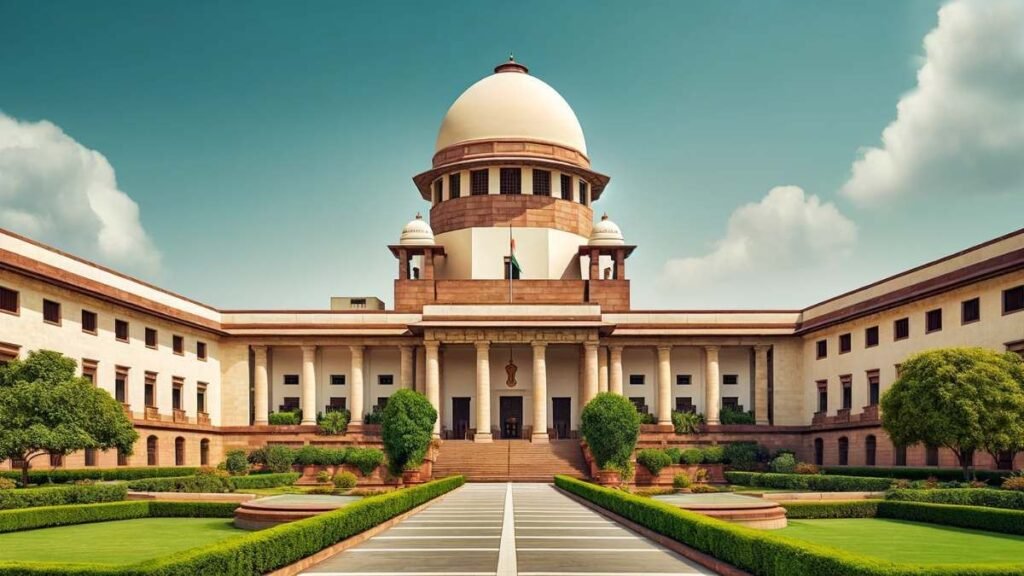Recent Posts
GST on Cement Cut to 18%: Relief for Real Estate and Affordable Housing
September 5, 2025TN Earmarks ₹1,964 Crore for Chennai Airport–Kilambakkam Metro Corridor
September 4, 2025Supreme Court: No Registration or Stamp Duty Required for Compromise Decree with Pre-Existing Property Rights

In a significant ruling, the Supreme Court has clarified that a compromise decree affirming pre-existing rights over a property does not require registration or stamp duty. The judgment was delivered by a bench comprising Justice JB Pardiwala and Justice R Mahadevan, overturning a Madhya Pradesh High Court decision that upheld the Collector of Stamps’ determination of ₹6.67 lakh stamp duty for such a decree.
The case pertained to land in Dhar district, Madhya Pradesh, acquired through a compromise decree in a civil suit filed in 2013. The decree was issued by the National Lok Adalat. The Tehsildar referred the case for mutation, leading the Collector to impose stamp duty, treating the decree as a conveyance under Article 22 of the Indian Stamp Act, 1899. This decision was upheld by the Board of Revenue and the High Court.
The Supreme Court ruled that such a decree merely reaffirms pre-existing rights and does not create new ones, thereby not qualifying as a conveyance. The Court outlined three conditions under Section 17(2)(vi) of the Registration Act, 1908, for a compromise decree to avoid registration:
1. It must be based on a genuine, non-collusive compromise.
2. It must pertain to the property in the suit.
3. It must affirm pre-existing rights without creating new ones.
The Court noted that since these conditions were met, neither registration nor stamp duty was applicable. It emphasized that the decree did not fall under the documents listed in Schedule I or I-A of the Indian Stamp Act, 1899.
Setting aside the High Court’s decision, the Supreme Court directed the authorities to update the revenue records in favor of the appellant without imposing stamp duty. The Court concluded that the consent decree does not operate as a conveyance since it does not transfer any rights.
- Build Watch News
- civil suit
- collector of stamps
- compromise decree
- conveyance
- high court judgment
- Indian judiciary
- Indian Stamp Act
- judicial ruling
- land disputes
- legal compliance
- legal news
- legal updates
- Lok Adalat
- Madhya Pradesh
- mutation process
- pre-existing rights
- property law
- property registration
- property rights
- real estate law
- registration act
- revenue records
- SC verdict
- stamp duty
- Supreme Court
- tax exemptions
Recent Posts
CMRL Fast-Tracks Okkiyam Maduvu Bridge Ahead of Northeast Monsoon
September 5, 202513.3-km Elevated Corridor Planned on ECR from Tiruvanmiyur to Uthandi
September 5, 2025Categories
- AP34
- Apartments12
- Bengaluru107
- Budget 202520
- Cement97
- Chennai287
- Construction527
- CREDAI11
- Editors Pick42
- Equipment17
- Events11
- GST7
- Highways56
- Housing90
- Hyderabad36
- Industrial208
- Infrastructure306
- Interiors11
- Iron Ore15
- Karnataka20
- Kerala19
- Land59
- Market Updates195
- Metal10
- Metro84
- Mining9
- MSME9
- News1,439
- NHAI39
- Paints31
- Properties7
- Puducherry5
- Real Estate420
- Road153
- Sand16
- Short News117
- SIPCOT2
- Steel Daily321
- Stocks6
- Tamil Nadu247
- Technology32
- Telangana14
- Trade2
- Trending News1,026
- Video1
Related Articles
Vardhman Special Steels, Japan’s Aichi Steel to set up $284 mn green steel plant in Punjab
Vardhiman Special Steels Limited (VSSL) signed an agreement for collaboration with Japan’s...
ByKanmani ChokkalingamSeptember 5, 2025CMRL Fast-Tracks Okkiyam Maduvu Bridge Ahead of Northeast Monsoon
Chennai Metro Rail Limited (CMRL) is trying to complete the construction of...
ByKanmani ChokkalingamSeptember 5, 202513.3-km Elevated Corridor Planned on ECR from Tiruvanmiyur to Uthandi
The Tamil Nadu State Highways Authority (TANSHA) has invited tenders for the...
ByKanmani ChokkalingamSeptember 5, 2025Serviced Residences Expand Beyond Tier-I Cities, Emerging Strong in Tourist Destinations
The burgeoning trend in India’s real estate is investment in serviced residences-these...
ByKanmani ChokkalingamSeptember 5, 2025















Leave a comment